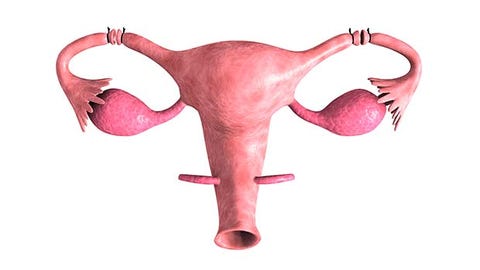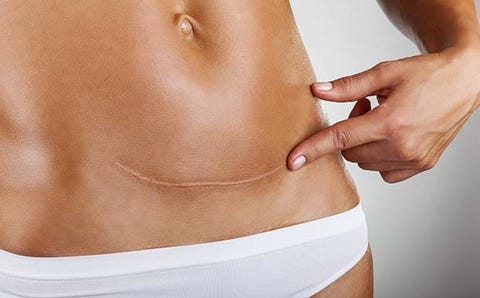what i need to know before getting my tubes tied
Perchance you already have the precise number of kids you lot always wanted, or possibly you've decided not to have children at all. If you lot're confident that making babies is non in your future, sterilization may have crossed your mind. Of the means to permanently cease your childbearing years, getting your tubes tied is the most popular: 27% of American women using contraception opt for information technology.
And yet, the procedure is not always well understood. Even many women who've had information technology done seem to exist confused about what actually happens and what it means for their reproduction abilities going forward. Here are ten important facts you demand to know. (Desire to balance out your hormones and lose weight? Then check out The Hormone Reset Diet to start feeling and looking better.)
1. Information technology's a major misnomer.
Yous'll never hear an expert employ the phrase "getting your tubes tied" because there'due south not much tying going on. The more than accurate (though less colorful) mode to depict this procedure is "tubal sterilization" or "tubal ligation," and there are several ways it tin exist done. Instead of tying your fallopian tubes upward in a dandy bow, your medico will clip, suture, or otherwise close them off in order to forbid sperm from getting through. Part or all of the tubes might be cut and removed. To admission your fallopian tubes, your surgeon volition make a 2- to iii-centimeter incision under the belly button. Or the procedure can be done laparoscopically through a few miniscule (half-centimeter) incisions. (Likewise much? Hither are 10 not-hormonal birth control methods.)
A related and newer method is chosen Essure. This incision-free technique involves having a doctor insert a tiny coil through your vagina and into your fallopian tubes, which prompts your body to make scar tissue that blocks the tubes off within a few weeks. You may have heard nigh this method in the news recently, thank you to some contempo concerns virtually side effects and complications. At the end of Feb 2016, the FDA instructed Essure's manufacturer, Bayer, to conduct more research into the risks of the device. The FDA also proposed changes to Essure'southward labeling, including a checklist doctors tin can use to meliorate evaluate the risks and benefits of the device as they pertain to a certain patient. Plus, "there is a technique to placing these devices," says Alison Edelman, Doctor, a professor of obstetrics and gynecology at Oregon Health and Science University's School of Medicine. "At that place tin can be problems around technical placement that aren't due to the device itself."
MORE: viii Reasons It Hurts During Sex—And How To Fix It
2. It really is permanent.
One reason docs are so opposed to the phrase "tube tying" is it creates the false impression that the tubes tin can be untied, says Nikki Zite, MD, an associate professor of obstetrics and gynecology surgery at the University of Tennessee. Many women fifty-fifty assume that the tubes will somehow untie themselves—without medical intervention—over time. "These women are very upset when they find out that'due south non the case," says Zite.
"These procedures are generally non reversible," says Vanessa Cullins, Dr., Planned Parenthood'south vice president for external medical diplomacy. That's why some doctors are reluctant to perform them on young women, who might not anticipate that they could one twenty-four hour period marry a new partner who wants kids or simply change their minds. If yous're not 100% certain that you're done having kids, Cullins suggests choosing a long-lasting—but non-permanent—selection like an IUD or an implant instead. (Here are 9 IUD facts you lot demand to know.)
3. The risks are small, but real.
Tubal ligation is fairly prophylactic, peculiarly if y'all're in overall good health, at a healthy weight, and haven't previously had surgery on that expanse of your body. In fact, there's less than a 1% take chances of complications. That said, you're having surgery, then the risk isn't zero. "At that place'due south anesthesia, which always carries a risk, and the surgeon is going into the abdomen, so there'south some risk of injuring the bladder and bowel," says Zite. (Read about Angelina Jolie'southward determination to take her ovaries and fallopian tubes removed.)
4. Yous need to do some homework.
One of the best ways to protect against surgical slipups is to thoroughly vet doctors before choosing one to operate on you. "Ask them how many they accept performed and what, if any, complications they accept ever had," says Cullins. "If they accept performed only five, find somebody else." You lot'll as well desire to find out how recently they have done this process. You lot want someone who says last week as opposed to last month. "If it'southward been a few months, they may exist rusty," says Cullins.
v. It's easiest right later a C-section.
Yeah, y'all can have a tubal ligation at any bespeak. Just if yous're about to give nascence to your terminal child via C-section, you can ask your doctor to do information technology while you're already cutting open and then you can avoid any boosted hurting or recovery time across what the C-section itself would crave. "It's relatively easy for both the patient and provider," says Zite.
Women having a vaginal birth tin can also volume a tubal ligation right later on a baby is built-in. You lot'll salvage yourself a render trip to the infirmary, but yous'll probably experience more pain than you would accept from childbirth alone and information technology may take you lot a few actress days to recover.
MORE: 9 Highly Constructive Solutions For Yeast Infections
six. A vasectomy is a heck of a lot easier.
If you and your partner have decided that permanent sterilization is the fashion to become, y'all ought to consider having him get snipped instead. (And it could lower his prostate cancer take chances.) Experts adopt vasectomy over tubal ligation for several reasons: "Vasectomy is far less risky," says Zite. "The guy'south anatomy is on the outside, you aren't going into the abdomen, and in that location's no general anesthesia involved." Cullins agrees, noting that a vasectomy is also cheaper and fifty-fifty more than effective at preventing pregnancy than tubal ligation is.
seven. Your body will still produce eggs while yous're premenopausal…
Eggs, produced in the ovaries, will have nowhere to become but into the abdomen or into blocked tubes, where your body eventually breaks them downwards and reabsorbs them. "They're so tiny, nosotros tin't even see them with our eyes," Edelman says. "You're non filling up your tummy with eggs!"
The female anatomy is a remarkable thing—this video proves information technology:
8. …which means you can still become significant.
It only takes "egg meets sperm," after all.
Female sterilization is said to be 99.v% effective in preventing pregnancy. For comparing's sake, a copper IUD clocks in at 99.two%; a hormonal implant at 99.95%; and the pill, patch, and band at 91%, with male person condoms somewhat far backside at 82%. Nix is perfect, clearly, only your chances of getting pregnant after having your tubes tied are teeny. "Aye, there are failures of permanent methods," Edelman says. "Notwithstanding, the failure rate is incredibly low."
If you do become pregnant, a major business organisation needs to be cleared up right away: the location of the fertilized egg. If it'southward in the uterus, however unbelievably, in that location's no firsthand problem other than the fact that you may not take wanted that pregnancy. (Oh, that.) But if the fertilized egg is inside the fallopian tube, the ovary, or elsewhere, information technology's what's called an ectopic pregnancy. "Ectopic pregnancies tin can be unsafe both for the adult female and the developing fetus," says Paula 1000. Castaño, Md, MPH, assistant attending in obstetrics and gynecology at New York Presbyterian/Columbia University Medical Eye, "and are really i of the truthful obstetric emergencies that exist." Depending on how far along the pregnancy is, your medico will recommend either medical or surgical abortion.
MORE: 5 Signs You're Not Getting Enough Vitamin D
nine. You might not recognize your period afterward.
Sterilization blocks the fallopian tubes, plain and elementary. It doesn't mess with hormones, and therefore information technology doesn't alter anything about your period or menopause. However! That doesn't hateful your menstruum itself won't alter—it simply won't be sterilization's fault. Here's why: Periods can change over time naturally in duration, severity, and symptoms. When something changes, it'due south normal to wonder why and to look for an obvious explanation. But Edelman theorizes that menstruum changes after sterilization are more than likely related to the birth control pill you lot stopped taking one time you lot were sterilized. "Hormonal contraception improves periods," she says. "It'south a squeamish do good nosotros don't often recognize is happening; periods get lighter, less crampy, and when women gain a permanent method and accept a hormonal method away, they're faced with periods that are a lot different."
That'due south why experts inquire patients about the benefits they've experienced on hormonal nascency control. If it's regulating weight or acne or cramps for you lot, you lot might not want to stop it, even with sterilization, Castaño says, or you might want to consider a long-term hormonal method instead.
This content is created and maintained by a third party, and imported onto this page to help users provide their electronic mail addresses. Yous may exist able to find more than information well-nigh this and similar content at piano.io
griffithatimenswo.blogspot.com
Source: https://www.prevention.com/health/a20495954/what-to-know-when-getting-tubes-tied/



0 Response to "what i need to know before getting my tubes tied"
Postar um comentário